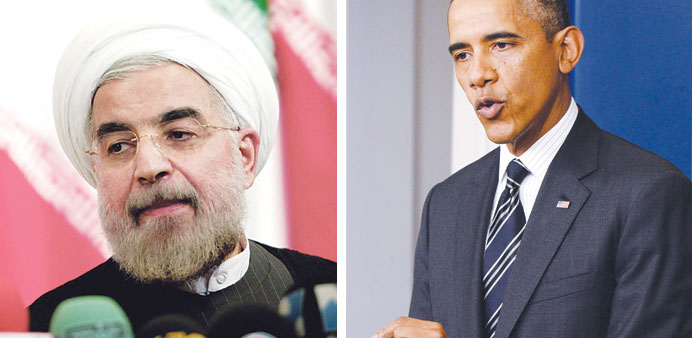|
Iranian President Hassan Rohani is serious about peace. But to achieve it, he and President Obama must deal with hardliners in Tehran, Tel Aviv and Washington. |
Rohani was the most moderate candidate in the recent Iranian presidential race, which he won on June 14, pledging to settle the nuclear dispute with Washington and thereby end the sanctions that are crippling his country. Rohani has strong credentials on the nuclear issue.
From 2003 to 2005, he was chief nuclear negotiator in the government of the reformist president Mohamed Khatami and led the negotiations with Britain, France and Germany that resulted in the 2004 Paris Agreement.
This committed Iran to suspend its uranium enrichment programme and allow the International Atomic Energy Agency (IAEA) to carry out the most extensive inspection of any nuclear programme in its entire history.
But instead of rewarding Iran, the West demanded more concessions, and the agreement fell apart.
To the chagrin of his conservative and radical foes at home, Rohani has completely revamped Iran’s nuclear negotiation team, bringing in a moderate, highly-skilled team. And he has appointed the esteemed US-educated diplomat, Mohamed Javad Zarif, as the foreign minister who will lead the nuclear negotiations.
Both Rohani and Zarif played key roles in the “grand bargain” proposal Iran submitted to the George W Bush administration in May 2003 that addressed all major areas of conflict between the two countries, including Iran’s nuclear programme, the war in Iraq and Iran’s support for Hamas, Islamic Jihad and Hezbollah. Iran even offered to indirectly recognise Israel.
But the Bush-Cheney administration rejected the proposal, preferring to demonise Iran.
In his recent visit to the United States, Rohani declared that he wanted to resolve the nuclear dispute in three to six months. But it won’t be easy.
Iranian hardliners have harshly criticised his overture to America. On his return to Tehran, Rohani was greeted by thousands of jubilant people, but also by those who threw shoes and eggs at him.
Israeli Prime Minister Benjamin Netanyahu stands in the way, as well. He has dismissed Rohani’s olive branch and would like to prevent any nuclear compromise between Iran and the United States.
And in Washington, the American Israel Public Affairs Committee and its supporters on Capitol Hill, along with such hawks as Senators John McCain, Republican-Arizona, and Lindsey Graham, Republican- South Carolina, are gearing up for a major fight with Obama to prevent any rapprochement between Iran and the United States.
Obama must fight back and not waste this historic opportunity for resolving the decades-old dispute between the two nations. If Rohani can deal with his hardliners in Tehran, Obama needs to be resolute with the hardliners in Tel Aviv and Washington.
Then peace will finally be a real possibility.
♦ Muhammad Sahimi, a professor at the University of Southern California, is the editor of the website Iran News & Middle East Reports. Readers may write to the author at: Progressive Media Project, 409 East Main Street, Madison, Wis. 53703; e-mail:

